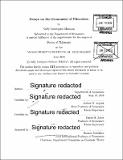| dc.contributor.advisor | Joshua D. Angrist and David H. Autor. | en_US |
| dc.contributor.author | Hudson, Sally Lindquist | en_US |
| dc.contributor.other | Massachusetts Institute of Technology. Department of Economics. | en_US |
| dc.date.accessioned | 2017-02-22T19:03:30Z | |
| dc.date.available | 2017-02-22T19:03:30Z | |
| dc.date.copyright | 2016 | en_US |
| dc.date.issued | 2016 | en_US |
| dc.identifier.uri | http://hdl.handle.net/1721.1/107099 | |
| dc.description | Thesis: Ph. D., Massachusetts Institute of Technology, Department of Economics, 2016. | en_US |
| dc.description | Cataloged from PDF version of thesis. | en_US |
| dc.description | Includes bibliographical references (pages 109-115). | en_US |
| dc.description.abstract | This dissertation combines three essays on the economics of education. The essays share a common focus on comparing experimental and non-experimental econometric methods. I present findings from randomized evaluations of two prominent education interventions for low-income students. In the spirit of LaLonde's (1986) pioneering re-analysis of experimental evidence on federal job training programs, I leverage the experimental data to assess nonexperimental methods for evaluating program impacts. The first chapter - written jointly with Joshua Angrist, David Autor, and Amanda Pallais - reports early results from a randomized evaluation of the Susan Thompson Buffett Foundation (STBF) scholarship, a large, privately-funded financial aid program for applicants to Nebraska's public colleges. Randomly-assigned scholarship offers boosted average grants received by $6,300 per year and dramatically improved enrollment and retention, especially for groups with historically-low persistence rates. Four years after award receipt, nonwhite students and first-generation college goers were nearly 20 percentage points more likely to be enrolled in college. Awards generated similarly large gains for students with the weakest high school GPAs in the eligible applicant pool. Over time, scholarships shifted many students from two- to four-year colleges, reducing associate's degree completion in the process. The economic returns to scholarship support will therefore likely hinge on whether award winners convert their extended enrollment into bachelor's degrees. The oldest study cohort will record its four-year graduation rate in the summer of 2016, but many students will likely take five or more years to finish. A complete picture of award impacts on degree receipt may therefore still be several years away. In the second chapter, I assess how selection bias distorts non-experimental estimates of STBF scholarship impacts. I show that observed gaps in retention rates between scholarship winners and rejected applicants overstate the causal effect of scholarships on dropout by nearly double. Controlling for high school GPA and Expected Family Contribution (EFC) - two widely-used criteria for awarding merit aid - explains roughly half the gap between the experimental benchmarks and observed enrollment rates. Conditional on GPA and EFC, however, additional demographic traits like race, gender, and parental education have little explanatory power. Thus, scholarship winners are positively selected on potential enrollment in the absence of treatment, and a variety of observational estimation strategies overstate the causal impacts of scholarships on enrollment and retention. Among the replication strategies, Kline's (2011) Oaxaca-Blinder procedure outperforms both discrete covariate matching and propensity score weighting on bias and precision. Because STBF award effects are larger for students who are less likely to win scholarships, linear regression estimates are even bigger than the biased estimates of treatment on treated (TOT) effects. In the final chapter, I use experimental estimates of Teach for America's (TFA) impacts on student achievement to validate a non-experimental strategy for measuring the long-run effects of hiring TFA teachers. Randomized evaluations show that TFA teachers outperform colleagues in boosting achievement at hard-to-staff schools. Despite this cross-sectional evidence, TFA's long-run effects remain unknown, a key concern for policymakers. High turnover among TFA recruits - who commit to serve for just two years - may undercut the long-run returns to hiring non-TFA teachers, who improve steeply with experience. To assess this potential tradeoff, I measure the short- and long-run effects of TFA hiring in North Carolina, where schools have employed TFA teachers since the program's founding in 1990. I identify TFA hiring effects by exploiting quasi-random variation in teacher hiring shocks across grades within schools. In the short run, TFA rookies increase math scores markedly relative to the non-TFA teachers schools might otherwise hire; TFA's initial advantage in reading is modest. When schools replace exiting TFA teachers with new TFA recruits, these gains more than offset the costs of lost experience, increasing long-run achievement. On the other hand, when TFA supply fluctuates, schools may have to replace exiting TFA teachers with inexperienced and lower-performing non-TFA hires. On net, short run achievement gains from one-shot TFA hiring still exceed the costs. JEL Classification: C93, I22, J63. | en_US |
| dc.description.statementofresponsibility | by Sally Lindquist Hudson. | en_US |
| dc.description.tableofcontents | joint work with Joshua Angrist, David Autor, and Amanda Pallais -- Early results from a randomized evaluation of post-secondary aid / Selection bias in observational estimates of financial aid impacts -- The dynamic effects of teach for America in hard-to-staff schools. | en_US |
| dc.format.extent | 115 pages | en_US |
| dc.language.iso | eng | en_US |
| dc.publisher | Massachusetts Institute of Technology | en_US |
| dc.rights | MIT theses are protected by copyright. They may be viewed, downloaded, or printed from this source but further reproduction or distribution in any format is prohibited without written permission. | en_US |
| dc.rights.uri | http://dspace.mit.edu/handle/1721.1/7582 | en_US |
| dc.subject | Economics. | en_US |
| dc.title | Essays on the economics of education | en_US |
| dc.type | Thesis | en_US |
| dc.description.degree | Ph. D. | en_US |
| dc.contributor.department | Massachusetts Institute of Technology. Department of Economics | |
| dc.identifier.oclc | 971481393 | en_US |
